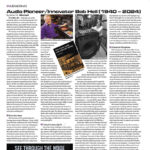
It was 20 years ago today. Not exactly, but it was damn close. While editing a magazine for musicians in midtown Manhattan, I got a prophetic phone call from a guy who ran a cover band in New Jersey.
While playing Frisbee in a park on a Sunday afternoon, his singer fell and broke a bone and went to the emergency room. (Note: The singer was not on a gig.) Like most musicians, he had no health insurance. But on the hospital admittance form, he listed the bandleader as his employer. And now, a couple of years later, the bandleader was looking down the barrel of having his home seized, because the Garden State had determined his singer did not qualify as a freelancer or independent contractor and was, in fact, an employee. Back then, there was no law about having to provide health insurance, so this was not even about the broken bone that the singer was still on the hook for. This was the state insisting the bandleader owed a bunch of money in payroll taxes for every musician he had ever used on a gig.
A lot has happened in the ensuing two decades. And since then, there’s been an explosion of people working in arrangements that musicians and production people have been part of for as long as there has been a music business.
The Gig Economy
A lot of people love the freedom that being a part of this economy brings. In that way, the dude or dudette driving for Uber or assembling your IKEA dresser via TaskRabbit are not that different from independent engineers or gigging musicians. You may remember a little economic hiccup from a decade ago, where as the economy recovered, it recovered a lot better for the folks running tech companies than it did for the guy carting tourists between the airport and the Strip. And as that rising inequality became a potent political issue, a bunch of policy wonks in California (why is it always California?) decided that the Gig Economy was the problem and that more government was the answer.
This is all introducing what we’re talking about here. California’s just-enacted law, Assembly Bill 5 (AB 5) basically transforms the situation confronting that New Jersey bandleader into law. A person like him is no longer a guy with a gig who pays hired guns to do individual gigs, but an employer no different than Apple or Old Navy — and applies that to the entire economy of the Golden State. And because of it, the live production business is about to get blindsided by this law of unintended consequences.
For this piece, I talked with four different sound company owners representing mid-sized regional outfits and larger companies with national footprints that are based in California. All of them are more or less terrified about this law, and none of them really wanted to have their names attached to their thoughts about it. All of them spoke “on background,” which is journalism-speak for “I’ll talk to you, but don’t put my name on it.”
So What’s This All About?
AB 5 is pretty simple on its face. It basically codifies a 2018 court decision that sets up a three-part test for determining if a worker can be treated as a contractor or if they have to be treated as an employee.
Prior to that court case, determining if someone was a contractor or an employee included more like five variables and was pretty murky. And, many companies used that murkiness for a long time to treat people who should have been employees as independents. And the system was probably in need of some reform. But AB 5 goes too far.
Under AB5, there is the “ABC Rule.” To not be considered an employee, the person in question must be A) free of company control (which means everything from being told how to do a job to being told when to do it); B) they must be doing work that is not central to the hiring entity’s business; and C) they must have an independent business doing something that is not central to the business of the hiring entity.
Got all of that? Bottom line is that on Jan. 1, 2020, if a business hires someone that is not themselves a business and pays them to do work that is central to the business of the person doing the hiring or if they control the time or method of the work, then the person they hire is not a freelancer, but an employee.
Or, as one of our sound guys explained: “For example, say I own a plumbing supply company, and I sell supplies and rent equipment to plumbers. And say a pipe breaks in my shop and I hire an independent plumber who buys and rents from me to fix it. If I am going to follow the law, I need to onboard him as a W2 employee. I have to withhold income and Social Security taxes, including paying the employer portion of those taxes.”
The result of this is that the costs of employing that independent plumber just went up — between paperwork and taxes — by at least 20 percent and maybe as much as 30 percent. Which leaves a few choices: 1) The person doing the hiring pays more than what they had budgeted for the work; 2) The person being hired puts at least 20 percent less money in their own pocket for doing the work; or 3) The person doing the hiring avoids the expense and hassle of hiring an indie and instead contracts with a plumbing company who sends a plumber employed by them as a W2 employee to do the work.
Got that? Now extend that out into the worlds of entertainment and production, where almost everyone on most gigs is an independent.
Picture this. A songwriter starts to get some traction on a tune and she books a three-week tour around part of California. For that tour, she hires a five-piece band and a sound engineer. Simple. And before Jan. 1, when AB 5 took effect, it still meant that either the band and engineer are getting paid “X” amount per gig ,or maybe the band is splitting the take from each performance. Starting Jan. 1, that all changed.
The person who puts a band together has to treat each of those band members as employees. Same with the sound engineer hired to mix. If the bass player gets food poisoning and can’t do a show and a local player is brought in just to save one gig, that player also has to be an employee. When the band gets back from tour and the songwriter starts to do local shows with different players, they are all considered employees. When the touring band goes out with a different artist — ditto the engineer — they become employees of the new artist.
Now say that Songwriter 1 is doing well enough that she books nine of those three-week runs over the course of the year and uses different bands and engineers for each run. Nine runs of three weeks each is 27 weeks, which is just over six months. If this was a company with at least 50 employees, they would have to be provided with health insurance. But between short tours and local gigs, that songwriter will have employed more than 50 people. Does the health insurance rule apply? Stay tuned.
But Wait… It Gets Worse
There are hundreds of little clubs in California that book touring bands. As presentation of live music is a core business function of those clubs, under this new law, they have to do all of the paperwork and withholding of an employee for every member of every band that plays in their venue if that band member is a resident of the state.
And let’s not even talk about touring, much of which becomes basically illegal. Not kidding. You know that 20-hour bus trip between tour legs? The entire ride is considered “on the clock” time for everyone, from the driver to the lowliest crewmember with the worst bunk.
Or what about a festival? A three-day event will often mean a solid week of work for a crew of freelancers between load-in, show days and load out. And each freelancer negotiates a rate that covers the entire week. But, given the new taxes, as well as the admin cost of hiring, firing and figuring out how to take that lump sum and divide it into an hourly rate that covers straight time, time-and-a-half and even double-time for long show days, those new costs mean freelancers can expect to see their negotiated rate come in as at least 20% less than what was negotiated. Remember, production companies get paid by promoters; and if you think promoters are gonna eat a 20-percent cost increase, you’re high on crack.
And the state takes this seriously. Even before this law took effect, we know of one good-sized regional company that thought they were well within the existing law but the state determined that, because the company controlled the time that freelancers work, that the freelancers should have been treated as employees for tax purposes. After an audit and legal fees, etc., the company got hit with a fine of close to a quarter of a million dollars — almost enough to put them out of business.
What’s Next?
AB 5 took effect on Jan. 1, and until there has been a test case or three, expect a lot of uncertainty. Some may be hoping for a change to the law — which has carve-outs for everyone from repo men to real estate agents to manicurists — but the chances of that are pretty bleak. Unlike all of the listed carve outs, there is no unified voice speaking for the production business. We don’t have a trade association that employs lobbyists who take politicians to lunch and know how to speak their language.
If you’re an independent tech or engineer, you may be able to escape some of the effects and continue working as an independent contractor if you carry your own liability and workman’s comp insurance and have taken the steps to have an actual EDD (Employment Development Dept.) number. Yet, even that is uncertain.
If you own some gear and have a small company and you hire freelancers, you need to get comfortable with legal and administrative tasks that you have never done before — and do it quickly. (Ever head of an S Corporation? You might want to start learning.) Or take the attitude that you are too small to be on anyone’s radar. But it just takes one person that you hire for one gig to make a complaint and you could be looking at fines that will put you out of business. And if you are not incorporated in order to protect personal assets, you may be in the same boat as the aforementioned bandleader who was losing his house.
Medium-sized companies are exploring options that include everything from using some kind of labor leasing company that would provide all labor from a pool that would be 100 percent free of any California residents to exploring moving everything except their warehouse out of state.
The sad part of this is the companies the bill really targeted — the Ubers of the world — have already said that they do not believe the law applies to them. In the case of Uber specifically, they say they are a technology company that develops platforms and that people then use their platform to do things like book transportation. That is, of course, an epic load of cow manure, but unlike the production biz, they have dozens of lawyers that can keep this tied up in court, likely for years.
If you own a production company outside of California, you may see this this as an opportunity, as the state just put companies based within its borders at a competitive disadvantage. But don’t get too comfortable, as other states are considering similar legislation, so it’s a matter of when, not if.
And as one leading CA-based soundco put it: “I’ve been at this for 40 years; through riots, earthquakes, 9/11, floods, fires, mass shootings — and have never felt more threatened with bankruptcy than with this.”
Bill Evans is a former editor of FRONT of HOUSE and freelance… er, independent… writer.



